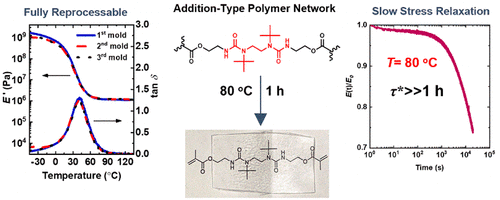当前位置:
X-MOL 学术
›
ACS Macro Lett.
›
论文详情
Our official English website, www.x-mol.net, welcomes your
feedback! (Note: you will need to create a separate account there.)
Reprocessable and Recyclable Chain-Growth Polymer Networks Based on Dynamic Hindered Urea Bonds
ACS Macro Letters ( IF 5.1 ) Pub Date : 2022-04-06 , DOI: 10.1021/acsmacrolett.2c00045 Mohammed A. Bin Rusayyis 1 , John M. Torkelson 2
ACS Macro Letters ( IF 5.1 ) Pub Date : 2022-04-06 , DOI: 10.1021/acsmacrolett.2c00045 Mohammed A. Bin Rusayyis 1 , John M. Torkelson 2
Affiliation

|
Conventional cross-linked polymers cannot be reprocessed because of the presence of permanent covalent cross-links, preventing reuse and recycling. Covalent adaptable networks (CANs) employ dynamic covalent bonds that undergo dynamic reactions under external stimulus, allowing recyclability of these network materials. Hindered urea chemistry is one of the recently discovered dissociative dynamic chemistries. While hindered urea bonds have traditionally been exploited in the synthesis of step-growth type CANs, the use of hindered urea bonds in the synthesis of chain-growth-type dynamic networks has only been narrowly explored. Here, we present a simple, catalyst-free, fast method to synthesize a hindered-urea-based dynamic cross-linker that can undergo a free radical polymerization with vinyl-type monomers or polymers to form reprocessable CANs. Using this cross-linker, we developed dynamic polymethacrylate networks that can be (re)processed at 80 °C. These dynamic covalent networks exhibit full recovery of cross-link density after multiple recycling steps; they are only the second chain-growth network synthesized directly and exclusively from carbon–carbon double bond monomers to demonstrate such recovery. Unlike other dissociative dynamic polymer networks, polymethacrylate networks that contain dissociative dynamic hindered urea bonds do not flow and maintain their network structure even at high temperature (300 °C). Despite its relatively fast reprocessability, the network showed delayed and extremely slow stress relaxation at the processing temperature. This work offers a simple approach to obtain reprocessable addition-type networks based on hindered urea bonds while revealing the limitations of stress relaxation experiments in relationship to the processability of some dynamic polymer networks.
中文翻译:

基于动态受阻脲键的可再加工和可回收链增长聚合物网络
传统的交联聚合物无法再加工,因为存在永久性共价交联,阻碍了再利用和回收。共价适应性网络 (CAN) 采用动态共价键,在外部刺激下会发生动态反应,从而使这些网络材料具有可回收性。受阻尿素化学是最近发现的解离动态化学之一。虽然受阻脲键传统上被用于合成逐步增长型 CAN,但在链增长型动态网络的合成中使用受阻脲键只进行了狭隘的探索。在这里,我们提出了一种简单、无催化剂、快速的方法来合成一种基于受阻脲的动态交联剂,该交联剂可以与乙烯基类单体或聚合物进行自由基聚合,形成可再加工的 CAN。使用这种交联剂,我们开发了可以在 80 °C 下(重新)加工的动态聚甲基丙烯酸酯网络。这些动态共价网络在多个回收步骤后表现出交联密度的完全恢复;它们只是第二个直接且完全由碳 - 碳双键单体合成的链增长网络,以证明这种恢复。与其他解离动态聚合物网络不同,包含解离动态受阻脲键的聚甲基丙烯酸酯网络即使在高温(300°C)下也不会流动并保持其网络结构。尽管其可再加工性相对较快,但该网络在加工温度下表现出延迟和极慢的应力松弛。
更新日期:2022-04-06
中文翻译:

基于动态受阻脲键的可再加工和可回收链增长聚合物网络
传统的交联聚合物无法再加工,因为存在永久性共价交联,阻碍了再利用和回收。共价适应性网络 (CAN) 采用动态共价键,在外部刺激下会发生动态反应,从而使这些网络材料具有可回收性。受阻尿素化学是最近发现的解离动态化学之一。虽然受阻脲键传统上被用于合成逐步增长型 CAN,但在链增长型动态网络的合成中使用受阻脲键只进行了狭隘的探索。在这里,我们提出了一种简单、无催化剂、快速的方法来合成一种基于受阻脲的动态交联剂,该交联剂可以与乙烯基类单体或聚合物进行自由基聚合,形成可再加工的 CAN。使用这种交联剂,我们开发了可以在 80 °C 下(重新)加工的动态聚甲基丙烯酸酯网络。这些动态共价网络在多个回收步骤后表现出交联密度的完全恢复;它们只是第二个直接且完全由碳 - 碳双键单体合成的链增长网络,以证明这种恢复。与其他解离动态聚合物网络不同,包含解离动态受阻脲键的聚甲基丙烯酸酯网络即使在高温(300°C)下也不会流动并保持其网络结构。尽管其可再加工性相对较快,但该网络在加工温度下表现出延迟和极慢的应力松弛。









































 京公网安备 11010802027423号
京公网安备 11010802027423号